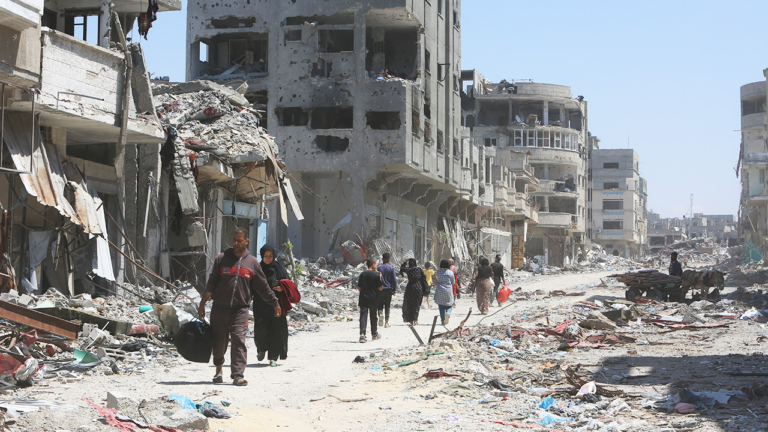
October 7, 2024 marks the one-year since the Hamas attack on Israel that killed some 1,200 people and precipitated the ongoing Israeli genocidal war on Gaza that thus far has killed almost 42,000 Palestinians and injured some 96,000 others. It is also a year since Hezbollah began what it called a war of support for Hamas, with the goal of alleviating the pressure on the group and on the Gaza Strip as a whole by attacking Israeli positions on the Lebanon-Israel border. Over the past twelve months, the Israeli war on Gaza has displaced almost the Strip’s entire population, with Israeli military operations repeatedly forcing Gazans to relocate from one locale and city to another. And Israeli-Hezbollah skirmishes since October 2023 have caused the displacement of some 60,000 Israelis and 110,000 Lebanese from border villages and communities as well as widespread destruction on both sides of the Blue Line, the United Nations demarcation between the two countries.
In recent weeks, Israel declared that the center of its military operations would shift from Gaza northward to face Hezbollah on the Lebanese border. Since September, the Israeli military has implemented a campaign of assassinations of Hezbollah leaders, including Secretary-General Hassan Nasrallah, and cadres. Israel also has bombed Hezbollah’s military positions as well as civilian areas in southern Lebanon considered a reservoir of support, in Beirut’s southern suburbs, in the country’s northeast, and elsewhere. Earlier this month, the Israeli military began a ground invasion of southern Lebanon, with the goal of establishing a buffer zone on the border in order to allow displaced Israelis to return to their homes. Israeli’s war against Hezbollah and Lebanon threatens to become a regional conflict that could draw in Iran and other Iran-aligned militias in Syria, Iraq, and Yemen.
Arab Center Washington DC (ACW) asked some of its analysts and fellows to analyze various aspects of the past year of Israel’s war on Gaza and now its campaign against Hezbollah and Lebanon. Their perspectives are below.
A Year After October 7: Israel’s Search for Elusive Victory Continues
Khalil E. Jahshan, Executive Director
The surprising infiltration by Hamas and other Palestinian militant groups of Israel’s borders with Gaza on October 7, 2023, and the subsequent devastating attacks on Israeli targets in the Gaza Envelope bordering the Gaza Strip, shocked Israel to the core. After all, the incursions represent the first assault on this scale since 1948, subsequently exposing the myth of invincible Israeli security.
The government of Prime Minister Benjamin Netanyahu quickly adopted a three-pronged strategy in retaliation:
- To fully defeat of Hamas by eliminating its military capabilities in order to prevent any future military threat to Israel from Gaza like what occurred on October 7.
- To secure the unconditional release of all hostages in Gaza held by Hamas and other groups such as Palestinian Islamic Jihad.
- To ensure the long-term security of Israel by depriving Hamas, as a political organization, of its ability to participate in the civil administration or governance of the Gaza Strip in the future.
A full year after Israel’s military retaliation through the pursuit of these three objectives, the Gaza Strip lies in ruins, with more than 66 percent of housing structures destroyed. According to the United Nations, the Strip has been reduced to 42 million tons of debris and rubble, which is estimated to need 15 years to clear. The 2.3 million inhabitants of Gaza suffered more than 41,800 dead and 96,000 injured, the majority of whom are women and children. In addition, 1.9 million Gazans have been displaced from their homes.
Meanwhile, Netanyahu has been desperately seeking to declare victory, proclaiming, at home and abroad, that victory over Hamas is “in sight” and that Israel was “a step away from victory.” But his goals remain as elusive today as ever. Hamas has not been fully eliminated in terms of its military or political capabilities. Indeed, on October 7, 2024, it fired four missiles at central Israel targeting Tel Aviv. Israeli military experts have admitted repeatedly that several Hamas units have regrouped and resumed their military resistance against Israeli troops in areas repeatedly cleared by the Israeli army. Hamas might be militarily diminished, but it is not eliminated or “defeated” by any stretch of the imagination, as recently claimed by Israeli army chief Herzi Halevi.
It is often said that victory is in the eye of the beholder. This is particularly applicable regarding Netanyahu’s claimed victory in Gaza. First, partially degrading Hamas’s military capabilities by reducing it, as described by CNN, from a formidable “professional fighting force” to a smaller “guerilla army” is not a decisive victory, even by Israeli Hasbara standards. Second, how could a country that just suffered its most devastating public relations implosion in history, including among its closest Western supporters, claim victory in its war of vengeance in Gaza? Third, according to political analysts, Israel struck out miserably in depriving Hamas of its political potential to administer and govern Gaza by failing to locate and install a new local leadership to replace it. Without doing so, it is difficult for Netanyahu to claim victory. Fourth, the dismal state of the Israeli economy because of its war on Gaza caused the country’s GDP to plunge 19.4 percent, accompanied by a 26.9 percent drop in public consumption. The flight of investments from Israel since October 7, the downgrading of Israel’s credit rating by S&P from A+ to A, and its bleak growth forecast of 0 percent for 2024 are not votes of confidence in a victorious Netanyahu government.
Based on these and other consequences of the war on Gaza, Israel’s claim of victory lacks credibility and is pyrrhic at best.
The Political and Media Establishment Remains Complicit in War Crimes
Tamara Kharroub, Deputy Executive Director and Senior Fellow
What preceded October 7, 2023, were decades of Israel’s widespread epistemic violence against the Palestinians and Palestinian narratives. Production of knowledge or information by Palestinians or about Palestine has been blocked and shut down, including through biased media framing and underrepresentation of Palestinian sources, suppression of speech and academic freedoms, information blackouts and censorship, and the biased political discourse that has been shielding Israel from responsibility and accountability for decades. These multi-faceted attacks on the Palestinian perspective and agency have been exacerbated by the persistent dehumanization and anti-Palestinian racism that continue to be normalized in mainstream discourse.
Today, one year into the genocide in Gaza, tens of thousands of Palestinians have been killed, millions displaced, and hundreds of thousands face starvation, famine, and disease, in addition to thousands killed in Lebanon and a million displaced in the continuing indiscriminate Israeli attacks against populated civilian areas, with no end in sight. Meanwhile, the Western media and political establishment continues to disregard the lives of Palestinian and Lebanese civilians, to ignore Israeli violations of international humanitarian law and the laws of war, and to omit any discussion of due process and accountability.
The mainstream information landscape that predated October 7 has only intensified. This media coverage consistently ignores Palestinian lives and victims, repeats Israeli claims as facts without scrutiny or investigation, regularly removes the context of occupation and international law, and uses passive framing and hyper-securitization when reporting on Israeli crimes, thus stripping Palestinian and Lebanese civilians off their humanity and absolving Israel of any responsibility. These patterns and policies of double standards and selective reporting, which have been documented by several quantitative studies and leaked memos from media outlets, have enabled the dehumanization and total disregard for Palestinian and Arab lives in today’s media coverage. This has served to mislead the audience, whitewash Israeli crimes, contribute to a climate of impunity, and enable the continuation of genocide.
Genocide and horrific atrocities are often enabled by the dehumanization of millions of people, and there is in fact legal precedent for holding media personalities and public figures accountable for their role in dehumanizing groups of people and inciting genocide and war crimes (e.g. in Rwanda). With the daily livestream of the Gaza genocide on social media platforms and ample evidence from international human rights organizations and legal bodies, mainstream media organizations have failed to fulfill their ethical and journalistic professional duties. As such, they are knowingly disseminating Israeli propaganda, censoring Palestinian perspectives, justifying Israeli actions, and dehumanizing Palestinians, thus rendering them complicit in Israeli crimes.
On the international political level, the wars in Gaza and Ukraine have exposed the hypocrisy and double standards of the rules-based international order, undermining the status of human rights and international law. For several months after October 7, the United States defied the international community and violated its own laws and obligations by blocking three ceasefire resolutions at the United Nations Security Council, by obstructing the work of the International Court of Justice and the International Criminal Court in preventing genocide and violations of international law, and by continuing to fund and militarily supply Israel’s war in Gaza.
The war on Gaza and US policy towards the conflict have not only exposed the failures of the international legal system and the shortcomings of the norms and principes that govern it, but also undermined US global standing and its ability to invoke international law elsewhere in the future. The double standards and failure to uphold international law in Gaza are promoting the erosion of the western-led post-World War II global order, which enshrined humanitarian protections into international law through the Geneva Conventions. This will have wider lasting implications for justice efforts around the world far beyond Gaza and well after this war.
This past year of impunity, persistent justifications across media channels and US official statements, and failure of the international justice system has revealed a vital need to reform the current global order into one that de-centers the political, media, military, and economic elites of the global north and ensures the fair and enforceable application of international law and accountability measures.
Has Military Support from the Axis of Resistance Made a Difference for Gaza?
Imad Harb, Director of Research and Analysis
Applying the principle of the “unity of fronts” against Israel, since October 7 Lebanese Hezbollah, Yemen’s Houthis, and Iran-friendly Shia militias in Syria and Iraq have tried to help Hamas face Israel in Gaza. Hezbollah immediately activated its arsenal of missiles and drones against Israeli positions on the Lebanon-Israel border and, later, against targets in northern Israel in response to the Israeli military’s bombing of Lebanese villages. The Party of God has for years been the most serious challenger to unchecked Israeli military action against Lebanon, Syria, and Iranian assets deployed to Syria in support of the regime of President Bashar al-Assad. Hezbollah has benefited from the near absence of the Lebanese state in southern Lebanon and from the effective inactivity of the Lebanese Army on the border to augment its military posture there.
On October 8, 2023, the party began to engage Israeli forces on the Lebanon-Israel border, ostensibly to alleviate pressure on Hamas in Gaza as the Israeli military started to bomb the Strip and Hamas assets there. Not to be upstaged, the Israeli military deployed its air power and artillery against Hezbollah as well as against civilian areas in southern Lebanon. But contrary to Hezbollah’s calculations, there was no concomitant relief for Hamas as Israeli leaders had vowed to take revenge for the October 7 attack. Israel commenced to systematically attack and destroy vital infrastructure facilities in Gaza, such as water and electricity generating plants, sanitation facilities, hospitals, schools, universities, and other civilian targets.
Yemen’s Houthis, in control of the capital Sanaa and the Yemeni state’s institutions since 2014, announced their solidarity with Hamas and Gaza and on many occasions targeted Israel’s southern seaport at Eilat and the city of Tel Aviv. In addition, they declared a war on maritime shipping to Israeli ports traversing the Red Sea and attacked Israeli and other cargo ships. In response, in December 2023 the United States announced the creation of Operation Prosperity Guardian, a coalition meant to protect shipping along the sea lanes. American and British navy assets also began attacking Houthi positions in Yemen but failed in ending the Houthis’ challenge to maritime security.
Similarly, Iraqi Shia militias considered part of the Axis of Resistance occasionally launched drone attacks toward Israel. They also attacked American positions in Iraq and on the Jordan-Iraqi border, where they succeeded in killing three US troops in January 2024. The militias’ threat, however, was negligible compared to that posed by Hezbollah and the Houthis, who are better equipped and more experienced in war. And although they have played their role in supporting Hamas and Gaza, Shia militias are circumscribed in their actions because of the delicate relations between the Iraqi government and the United States, Israel’s main supporter and weapons supplier.
After one year of the start of the current Israeli war with Hamas and other Axis of Resistance factions, there are some obvious conclusions. First, the involvement of the factions of the Axis of Resistance in supporting Hamas and Gaza does not appear to have deterred Israel’s actions or atrocities against the Strip and its people. They may have busied the Israeli military, especially on the Lebanese border, but they failed to convince Israel to withdraw any of its assets or troops from the Gaza front or limit its objectives there. Second, although Israel did not need an excuse to attack Hezbollah and Lebanon, the party’s launching a war of support for Hamas on the Lebanon-Israel border has allowed the Zionist state to claim that it was under attack and must retaliate, in the process destroying much of southern Lebanon and displacing hundreds of thousands of civilians. Third, the factions’ close relationship with the Islamic Republic of Iran allowed Israel to claim that they are mere proxies of Tehran, that Iran coordinates their actions to serve its interests, and that they have no legitimate rights of their own.
The Past Year Has Glaringly Exposed US Double Standards
Annelle Sheline, Non-resident Fellow
The past year has exposed the fact that the most senior members of the Biden administration view the lives of Palestinians and Arabs as less valuable than the lives of Israelis. This stance is incompatible with the universalist values that the US government claims to espouse and upon which the United States bases its claim to global leadership. According to American rhetoric, the world should follow the example of US democracy, respect for human rights, and fundamental freedoms; those who seek to challenge American dominance—specifically China and Russia—will not protect these universal values. And yet the actions of the US government over the past year toward the Gaza war irrefutably demonstrate the hypocrisy and callous disregard for the equality of human life at the core of American foreign policy.
The reasons for this disregard are likely a combination of the enduring influence of the Israel lobby on American politics; the personal views of senior officials, including Biden himself; and the racism and Islamophobia that continues to animate the American public’s views of the Middle East.
The power of the Israel lobby came into clearer focus this year, when it successfully backed primary challenges to two Black members of the House of Representatives who had strongly criticized Israel’s actions in Gaza. Yet the millions of dollars openly spent on this effort prompted many Americans to question, some for the first time, whether a policy that best suited Israel’s interests also reflected US interests.
Having worked for a year for the Biden administration, in the Department of State’s Bureau of Democracy, Human Rights, and Labor’s Office for Near East Affairs, I can testify to the fact that in my office, concern for the human rights of people in the Middle East was genuine. For example, after October 7, Deputy Assistant Secretary Christopher Le Mon, in accordance with US law, recommended denying weapons that Israel had requested, due to clear evidence of Israeli human rights violations. Yet other than a single shipment of rifles, the weapons were sent. This episode was typical of my experience between October 7 and when I resigned in late March 2024: senior officials ignored all forms of dissent or concern about US support for Israeli military actions in Gaza. In a bureaucracy like the Department of State, lower-ranking members of the hierarchy have minimal ability to change the outcomes desired by those at the top, in this case by President Joe Biden, his senior Middle East advisor Brett McGurk, and Secretary of State Antony Blinken.
The US government’s insistence on providing unprecedented levels of military support to Israel over the past year is enabled by persistent racism and Islamophobia in mainstream American media discourse and public opinion. This reflects a failure on the part of American policymakers, and the American public as a whole, to combat the misplaced fears that fused Islam and terrorism following the September 11, 2001 attacks, which were themselves fueled by the lingering humiliation of the Iran hostage crisis of the late 1970s.
The scale of the human suffering in Gaza, and now Lebanon, as well as its dissemination through social media—a livestreamed genocide—have challenged the dehumanization of Palestinians, Arabs, and Muslims that has long characterized the mainstream American perspective. But even as American public opinion has shifted against the view that Israeli actions are justified, the American government maintains its position. Although the Biden administration continues to repeat the official line that it is working toward a ceasefire and desires a two-state solution, it has become increasingly clear that the administration supports everything that Israel is doing.
Featured image credit: Shutterstock/Anas Mohammed




